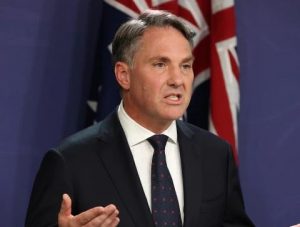New Delhi: Australia Wednesday said it is vital that China commits to resolving the eastern Ladakh border row with India through a process of dialogue consistent with international law and asserted that the growing security ties between New Delhi and Canberra should not be seen as directed against Beijing. In an address at the National Defence College in Delhi, visiting Australian Deputy Prime Minister Richard Marles said the global rules-based order matters everywhere, including in the highest place on earth, seen as an oblique reference to the eastern Ladakh region. “The assault on Indian forces along the Line of Actual Control in 2020 was a warning we should all heed.
Australia stood up for India’s sovereignty then and continues to do so now,” he said in an apparent reference to the Galwan Valley clashes. “It is vital that China commits to resolving this dispute through a process of dialogue consistent with international law. The global rules based order matters everywhere, including in the highest place on earth,” he said.
On India’s stand on the Ukraine crisis, Marles said he would not like to lecture New Delhi on how it should respond to this conflict, or how it should manage its relationship with Russia, adding every country needs to make its own choices. Referring to Beijing’s large-scale military build-up, he said it is critical that China’s neighbours do not see it as a risk for them as without that reassurance, it is inevitable that countries will seek to upgrade their own military capabilities in response. The Australian deputy prime minister said large-scale military build-ups must be transparent and they must be accompanied by statecraft that reassures other countries.
“China’s military build-up is now the largest and most ambitious we have seen by any country since the end of the Second World War. It is critical that China’s neighbours do not see this build-up as a risk for them,” he said. Marles, who is also Australia’s defence minister, said insecurity is what drives an arms race and that India’s own experience “illustrates this maxim more than most.
” He made the comments hours after he held extensive talks with Defence Minister Rajnath Singh during which they reviewed regional security matrix and reaffirmed their shared objective for an open, inclusive and rules-based Indo Pacific amid growing Chinese bullying in the region. “As we continue to lift our defence and security cooperation, exploring longer-term reciprocal access arrangements is the logical next step. It will not be lost on any of us that deeper Australian-Indian security cooperation is often seen as a response to a rising China,” he said.
The Australian deputy prime minister said there is nothing remarkable about two democracies working together in response to strategic change. At the same time, he said it would be wrong to assume that China is at the centre of every decision. “We all expect a more powerful China to have a stronger say in regional and international affairs.
But what is important is that the exercise of Chinese power exhibits the characteristics necessary for our shared prosperity and security,” Marles said. “Respect for agreed rules and norms. With trade and investment flow based on agreed rules and binding treaty commitments.
And where disputes among states are resolved via dialogue, and in accordance with international law,” he said. “This is vital when it comes to the rearmament we are witnessing in the Indo-Pacific,” he added. The Australian deputy prime minister said his visit to India reflects the commitment of his government to place India at the heart of Australia’s approach to the Indo-Pacific and beyond.
Marles also talked about the Russian attack on Ukraine saying the war in Europe is another warning. “I do not come here to lecture India on how it should respond to this conflict, or how it should manage its relationship with Russia. Every country needs to make its own choices,” he said.
“But Russia’s war on Ukraine does teach us that we cannot just rely on economic interdependence to deter conflict; and that deterrence can fail when one country’s determined military build-up creates an imbalance of military power,” he said. Marles said Australia is drawing a lesson from the conflict. “This informs my government’s intention to transform the Australian Defence Force into one with more potent deterrence capabilities, including long-range and precision strike weapons, offensive and defensive cyber, and area denial systems,” he said.
“The same logic underpins the decision to acquire nuclear powered submarines with the US and the UK under AUKUS. A partnership that will also guide accelerated development of advanced defence capabilities where they have the most impact, such as quantum technology, artificial intelligence, undersea warfare, hypersonics and counter-hypersonics,” he said. The AUKUS (Australia, the UK and the US) security partnership announced in September last will facilitate Australia getting technology to build nuclear-powered submarines.
PTI.
From: orissapost
URL: https://www.orissapost.com/australia-backs-india-over-border-dispute-with-china/



